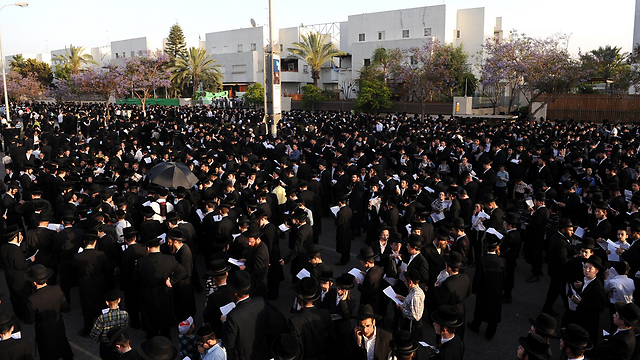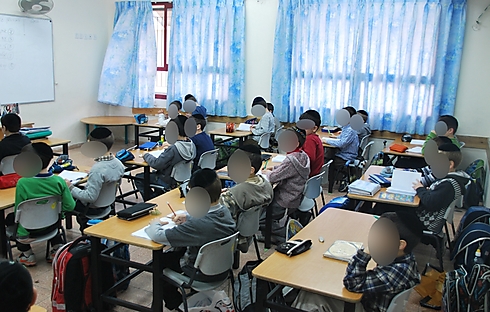A message from two of the Councils of the Torah Sages announces that, among other things, there will be no cooperation with the Education Ministry on matters of determining the curriculum, educational staff and student enrolment.
The ultra-Orthodox battle against Yesh Atid leader Yair Lapid’s integration reforms has not stopped with the now-defanged draft law, and they are now targeting changes made in the previous government to Haredi educational institutions.
The spiritual leadership of the United Torah Judaism party is calling on heads of ultra-Orthodox educational institutions not to cooperate with the government’s supervision over them with regard to determining the curriculum, enrolment of students (including the “Sephardi quotas”) and employment of teachers.

Former education minister Shai Piron’s ministry was over-involved in the affairs of ultra-Orthodox institutions, the rabbis claim, so they will not agree to supervision until the previous situation is restored.
The message, which was published by two of the party’s Councils of the Torah Sages via the Rabbinical Committee for Educational Affairs that works under them, further stipulated: “There will be no cooperation with supervisors from the Ministry of Education, but rather with supervisors from within the ultra-Orthodox system that the institution belongs to.
“There will be no response to the letters and instructions of the Ministry of Education that harm the independence of the institution,” the rabbis wrote. “There will be no enrolment of students that do not meet the terms of the institution from a spiritual perspective, and no involvement of the authorities on this matter will be permitted.”
Members of the committee emphasized that the decisions are binding on all educational institutions in the sector, including kindergartens, and explained that the Ministry of Education had over the past few years damaged the independence of ultra-Orthodox education due to their involvement in the curriculum, enrolment of students and recruitment of staff.
The trigger: Fight against ethnic discrimination
At the same time as fighting to put brakes on the involvement of the state in internal ultra-Orthodox affairs, activists in United Torah Judaism are also working the political scene – mainly through Deputy Education Minister Meir Porush – in order to try and weaken state supervision over their institutions.
The likely reason for this is that the ministry is currently seeking a new manager for the ultra-Orthodox post, to replace Meir Shimoni who was appointed by Piron.

Unlike the rabbis and faction members of United Torah Judaism, educators and parents from the ultra-Orthodox sector have spoken up over the last few days and are convinced that the supervision of the previous minister actually helped them. They claim that in general there was no impact on the curriculum.
According to them, many have acceded to the demand of politicians and the rabbis do not represent them. Rather, they are harming them.
In a letter sent by several yeshiva heads and public figures to Education Minister Naftali Bennett, along with an online petition that has already been signed by hundreds of parents, they blame the fury of the institution heads as resulting from the Education Ministry’s fight against ethnic discrimination. Consequently, they incited the rabbis against supervision.
“Over the last three years, and with the establishment of an ultra-Orthodox post in the Ministry of Education, the ministry started to tighten its supervision and enforcement procedures on ultra-Orthodox educational institutions that are known not to be official entities, as obligated by the law,” they wrote.
“With this, a years-long historical injustice was corrected,” they continued. “The managers of educational institutions and organizations, who in the past could do whatever they wanted, were not comfortable with the new situation.
“As such they used all their political power to restore the previous situation,” the letter added.
Previous processes, the letter clarified, were conducted according to various interests and not in line with the genuine needs of the public.
The letter’s signatories called on the Education Minister to fight discrimination against Sephardi ultra-Orthodox, the employed, and those who serve in the army, all of whose children struggle to get into elite institutions.
The letter’s authors also called for administrative and financial supervision, and for the development of frameworks that address a growing ultra-Orthodox population that “has studying at its heart.”
As reported by Ynetnews
